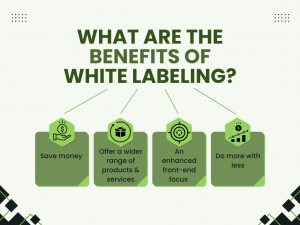A Comprehensive Guide to White Labeling
 In today’s rapidly changing business world, where innovation is key and customer needs are always shifting, companies are constantly looking for ways to grow their offerings quickly and effectively. White Labeling has become a go-to tactic in many industries, allowing businesses to use existing products or services and put their own brand name on them. In this post, we’ll take a closer look at white labeling, covering what it is, why it’s beneficial, the obstacles it presents, and how it’s used in different fields.
In today’s rapidly changing business world, where innovation is key and customer needs are always shifting, companies are constantly looking for ways to grow their offerings quickly and effectively. White Labeling has become a go-to tactic in many industries, allowing businesses to use existing products or services and put their own brand name on them. In this post, we’ll take a closer look at white labeling, covering what it is, why it’s beneficial, the obstacles it presents, and how it’s used in different fields.
What is White Labeling?
White Labeling is a simple yet powerful concept. It involves rebranding products or services that are developed by one company and selling them under another brand’s name. Essentially, it’s like putting your own label on a product that’s already tried, tested, and ready to go.
Benefits
Speed to Market: White Labeling enables you to swiftly deliver your products to customers by bypassing the time-consuming product development stage. This flexibility is crucial in today’s fast-paced market environment, allowing you to respond promptly to changing market dynamics.
Cost Efficiency: Developing new products from scratch can be costly. By white labeling existing products, you can save on research, development, and production expenses, allowing you to allocate resources more strategically.
Brand Expansion: White Labeling offers chances to grow your brand. Whether you want to expand your product range or tap into new markets, this tactic lets you use your brand’s reputation to attract a wider audience.
Challenges
While white labeling offers numerous advantages, it’s not without its challenges. Maintaining quality control, managing supplier relationships, and ensuring brand consistency are just a few hurdles to overcome. However, with careful planning and execution, these challenges can be effectively addressed.
Real-World Applications
White Labeling is widespread across different sectors, including retail, technology, and health. Businesses, regardless of size, utilize this strategy to introduce unique product ranges, customize software solutions, or provide personalized services. This approach fuels growth and fosters innovation in various industries.
White Labeling is a smart move for businesses to grow faster, stay competitive, and keep up with what customers want. By using existing products and services, companies can make more money, become more well-known, and set themselves up for success in the long run. So don’t hesitate—take advantage of white labeling now to make the most of your business.
Author- Moumita Ghosh









Leave a Reply